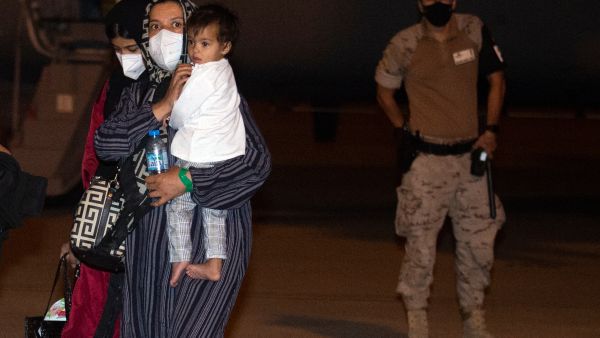Threats of economic sanctions on the Taliban would continue the human rights abuses that US and allied forces have brought upon Afghans over the last two decades.
Punitive sanctions on neighboring Iran also put thousands at risk as people attempt to cross into Iran following the Taliban’s capture of Kabul on 15 August.
The UK Prime Minister Boris Johnson has said that his government will push for sanctions on the Taliban.
"It is vital that the international community works together to ensure safe evacuations, prevent a humanitarian crisis and support the Afghan people to secure the gains of the last 20 years," Johnson Tweeted on Sunday.
Asked whether he supports the idea of sanctions, Joe Biden said, "The answer is yes. It depends on the conduct."
The UK Foreign Secretary Dominic Raab, who was holidaying whilst the Taliban captured Kabul, wrote on Monday that, "[the UK] will use all of the levers at our disposal, including sanctions, aid and access to international finance system, and we are rallying our international partners around these shared priorities.”
Following the meeting of G7 leaders on Tuesday, there was no mention in the official statement of plans towards the introduction of new sanctions on the Taliban. Promises of assistance to humanitarian providers and coordination between international bodies were given, alongside the continued call for greater rights for women, girls, and minorities in the country.
Phantom aid has been an ongoing problem in Afghanistan since the 2001 invasion. Aid from the US has disproportionately gone towards “Peace and Security” projects.
Al Bawaba understands there has been a rise in the number of those crossing the border, officially or unofficially, into Iran. Reports of a huge rise in the number of Afghan refugees entering NGO facilities in Tehran as well as other areas of the country have also surfaced.
It is also understood that some of those displaced by fighting in the west of the country who moved towards the major city of Herat have now returned to their homes.
Meanwhile, on 18 August it was reported that Iran had ordered that the border be closed to refugees fleeing from Afghanistan. More than three million Afghans have entered Iran over the last four decades of war, but relatively few have gained citizenship.
Afghans had previously been returning to their home country in recent years, with approximately 820,000 people crossing back over the border in 2018. In 2017, there were at least 610,000 returnees. Harsh economic and climate conditions had forced many back home.
UNHCR Urges Afghan Neighbor States to Keep Borders Open#Afghanistan https://t.co/OxFdvkekQa pic.twitter.com/ePcoRIK6Kq
— TOLOnews (@TOLOnews) August 22, 2021
Greece and Turkey are erecting walls along their borders as politicians fear a backlash from a possible rise in migration due to the US’ botched departure which left tens of thousands of people who had worked with the US during the occupation fearing for their lives.
Migration risky as Iran is still struggling under the weight of hefty US economic sanctions following Donald Trump’s withdrawal from the Iran Deal, or the Joint Comprehensive Plan of Action (JCPOA), in 2018.
40 years of war have taken an immense toll on the Afghan people.
— Dominik Stillhart (@DStillhartICRC) August 25, 2021
One thing remains unchanged in #Afghanistan – the humanitarian needs.
In the past few months alone, hospitals we support have treated over 40,000 people wounded by fighting.
US and European nations, particularly France and Britain, have given minuscule numbers for refugee intake following twenty years of bloodshed.
Representatives from Iran, China, Russia, France, Germany, United Kingdom, the European Union, and the US are soon expected to land in Vienna after a pause in negotiations from July while the newly elected Iranian President Ebrahim Raisi formed a government.
By 31 August, after negotiations for an extended deadline fell through, all US personnel will be out of Afghanistan and the hawks in Washington will be setting their sights on new targets as part of the “pivot to Asia;” a trend in US foreign policy that promises little peace for the rest of the world.
If, after two decades of war, Joe Biden, Boris Johnson, and their counterparts in the G7 decide to impose economic sanctions on the Afghan people, the idea that the war in Afghanistan was waged in the interests of the Afghan people will fall from the mouths of supporters for the war as Kabul fell from the US and allied troops a little over a week ago.









